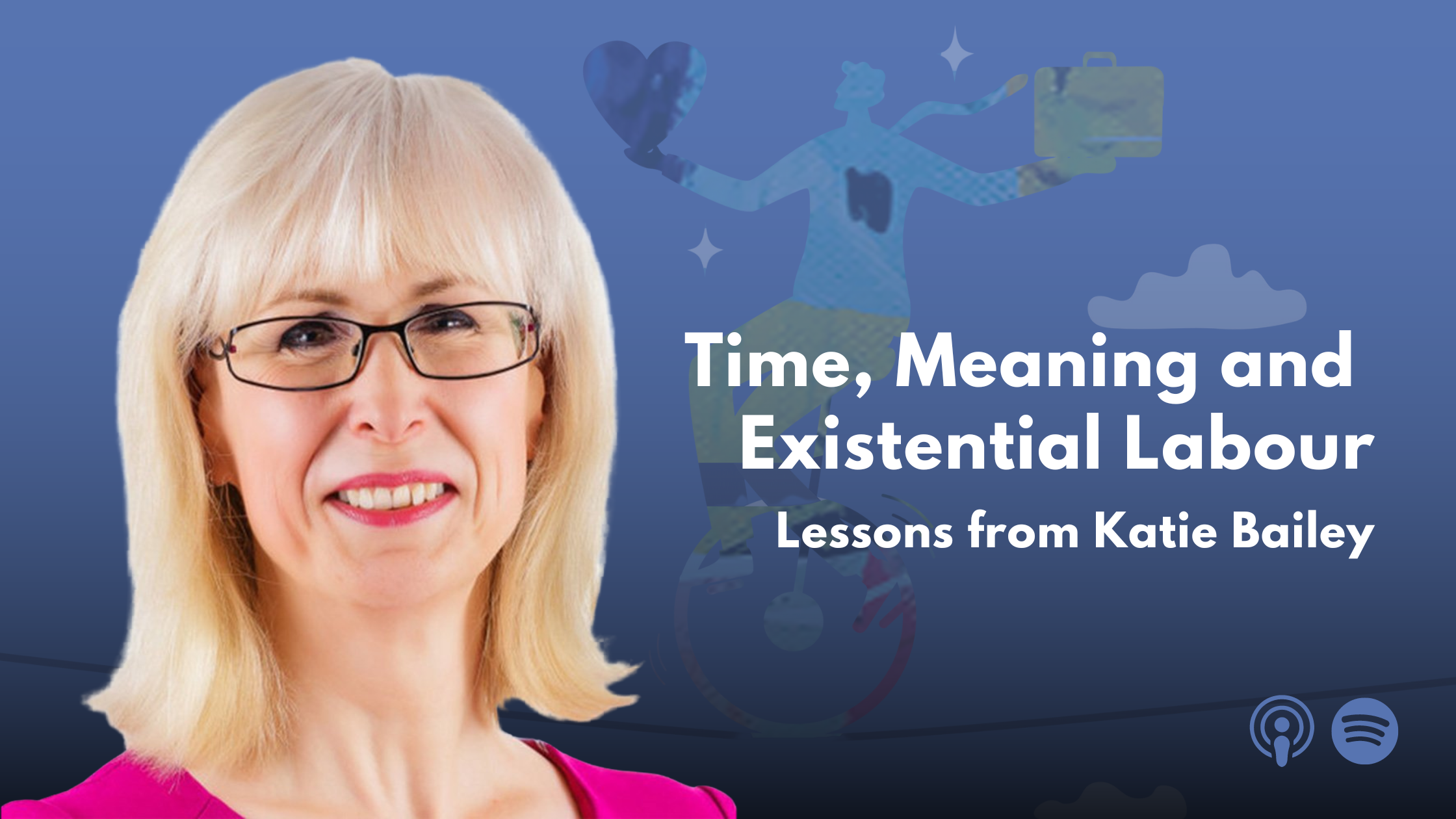This Meaningful Work Matters episode features Dr. Katie Bailey, a Professor of Work and Employment at the King’s College London. Her research focuses on meaning and purpose at work, temporality and interstitial times and spaces in organizations, employee engagement, and strategic human resource management.
Katie takes us on a tour of the various ways that meaningful work has been defined in the academic literature, the ways that time truly matters when it comes to finding meaning at work, and how we can create an ethical environment for meaningful work by reducing the gaps between what we say and what we do when it comes to designing roles, tasks, interactions, and building organizational cultures that support individuals as they pursue meaningful work.
The Multi-Faceted Nature of Meaningful Work
Bailey has spent years exploring the complexity of meaningful work in research and practice. She emphasizes that meaningful work goes far beyond job satisfaction or employee engagement because it is intertwined with our most human sense of identity and purpose. She notes that in the literature, there are many different definitions of meaningful work, but they can be primarily broken down into two broad perspectives:
Subjective Dimension: From one perspective, meaningful work is seen as subjective, essentially down to the individual. It's in the eye of the beholder, where people decide daily whether their work is subjectively meaningful to them. Psychologists who regard meaningful work as an attitude similar to job satisfaction often hold this view. It's a personal assessment based on individual feelings and perceptions.
Objective Dimension: The other perspective views meaningful work as an objective attribute that some jobs have and others don't. This view is shared by sociologists, ethicists, and political theorists. They believe that society objectively determines meaningful work, with specific attributes that make it meaningful. These attributes include autonomy, dignity, freedom, and receiving feedback. Jobs possessing these characteristics are considered meaningful objectively, regardless of an individual's feelings or perceptions.
Four Pillars of Meaningful Work
Bailey points to the work of Marjolein Lips-Wiersma, who maps meaningful work into four key pillars: contribution, belonging, self-actualization, and being your best self. These pillars provide a roadmap for individuals and leaders to assess and enhance the meaningfulness of their work. Contribution emphasizes the impact of one’s work on the greater good while belonging underscores the importance of community and connection in the workplace. Self-actualization speaks to the personal growth and development that work can foster, and being your best self highlights the alignment of work with one’s core values and strengths.
The Role of Time in Finding Meaning
Bailey’s insights into the temporal aspects of meaningful work are pioneering. She highlights how autonomy and the freedom to manage one's time can significantly influence the sense of fulfillment in one's job. However, her latest research explores how the ability to see past contributions or future impact can all influence perceptions of meaningfulness. Bailey shares a fascinating example of her research with stonemasons repairing centuries-old cathedrals in the UK. By seeing the "banker marks" left by prior workers hundreds of years ago and knowing their marks would be viewed similarly far into the future, stonemasons tend to feel a profound long-term connection to their work.
The Double Edge of Meaningful Work
Bailey points out many positive benefits to individual well-being and organizational performance when people are engaged in meaningful work. Still, there are dark sides to meaningful work, which are essential to be aware of. She highlights two key aspects:
Sacrifices for Meaningful Work: Bailey points out that when individuals see their work as deeply meaningful, they might be willing to make detrimental sacrifices to their well-being. This suggests that pursuing meaningful work can sometimes lead to neglecting personal health, work-life balance, or other aspects of life, as the individual becomes overly invested in their work.
Existential Labor: Another concept Bailey discusses is "existential labor." This occurs when organizations put intense cultural pressure on employees to find their work meaningful. Employees might be continually told that their work is meaningful and fulfilling. However, if they don't genuinely feel that sense of meaningfulness, they may start acting as if they find their work meaningful when they do not. Existential labor is the act of pretending or performing to meet external expectations. It can be seen as a form of emotional labor where employees must manage and modify their emotions and expressions to align with organizational expectations, even if these do not reflect their true feelings.
Ethical and Practical Insights for Fostering Meaning
Bailey emphasizes the importance of organizations creating an environment that enables individuals to find their version of meaningfulness. Bailey discusses the critical role of leaders in creating an environment where meaningful work is accessible to all. This involves a commitment to ethical leadership practices, prioritizing employee well-being, and aligning organizational goals and job design with espoused values. From a practical standpoint, Bailey suggests ways to embed meaningful work into the fabric of organizational culture. This includes designing roles that provide a sense of significance, encouraging positive interactions among team members, and aligning tasks with a clear and compelling organizational purpose. These strategies are essential for leaders aiming to reconcile personal values with work demands and those seeking to manage stress and prevent team burnout.
Final Thoughts
Katie Bailey’s profound insights on meaningful work remind us that the journey to finding meaning in our professional lives is deeply personal yet universally impactful. Meaningful work is not just about the tasks we perform but also about the environment we cultivate, the relationships we build, and the ethical considerations we uphold.
As professionals and leaders striving for positive change, let's embrace the responsibility of creating an ecosystem where every individual can discover what meaningful work means to them. In doing so, we enhance our experiences and contribute to a culture of well-being and purpose that extends far beyond the walls of our workplaces.


